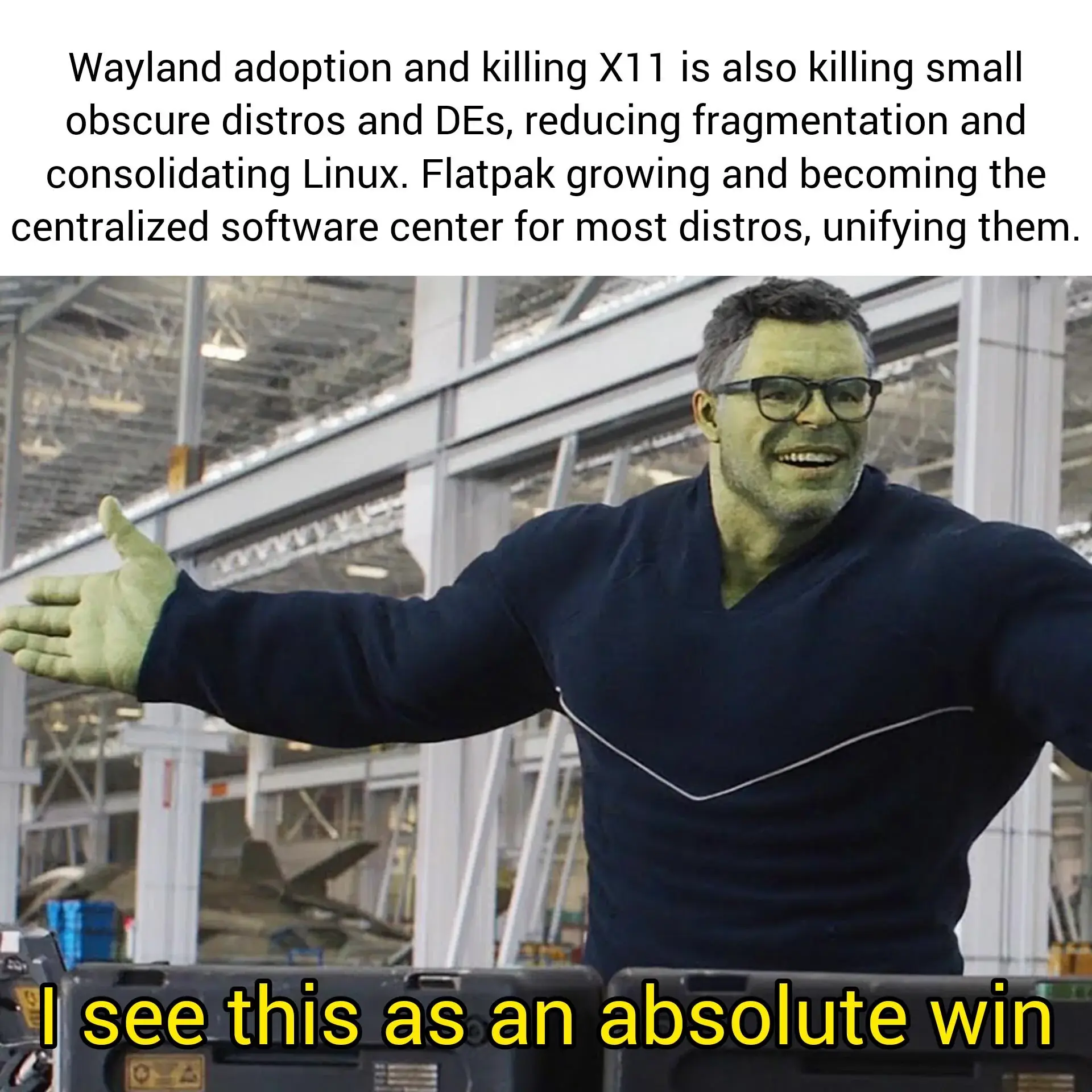this post was submitted on 12 Jan 2024
296 points (81.2% liked)
linuxmemes
21746 readers
413 users here now
Hint: :q!
Sister communities:
Community rules (click to expand)
1. Follow the site-wide rules
- Instance-wide TOS: https://legal.lemmy.world/tos/
- Lemmy code of conduct: https://join-lemmy.org/docs/code_of_conduct.html
2. Be civil
- Understand the difference between a joke and an insult.
- Do not harrass or attack members of the community for any reason.
- Leave remarks of "peasantry" to the PCMR community. If you dislike an OS/service/application, attack the thing you dislike, not the individuals who use it. Some people may not have a choice.
- Bigotry will not be tolerated.
- These rules are somewhat loosened when the subject is a public figure. Still, do not attack their person or incite harrassment.
3. Post Linux-related content
- Including Unix and BSD.
- Non-Linux content is acceptable as long as it makes a reference to Linux. For example, the poorly made mockery of
sudoin Windows. - No porn. Even if you watch it on a Linux machine.
4. No recent reposts
- Everybody uses Arch btw, can't quit Vim, <loves/tolerates/hates> systemd, and wants to interject for a moment. You can stop now.
Please report posts and comments that break these rules!
Important: never execute code or follow advice that you don't understand or can't verify, especially here. The word of the day is credibility. This is a meme community -- even the most helpful comments might just be shitposts that can damage your system. Be aware, be smart, don't fork-bomb your computer.
founded 2 years ago
MODERATORS
you are viewing a single comment's thread
view the rest of the comments
view the rest of the comments

Well explained 👍.
It is not a 'fad". Major distros have defaulted to Wayland (Ubuntu, Fedora, Red Hat, Debian, Manjaro etc).
X11 is old and designed for use cases in the 1980s. A lot of features have gradually moved out of X11 into the kernel or into other compositor systems. But the core X11 system is still limited by legacy design decisions and needing work arounds (which are complex to build and maintain).
Wayland is built to be the modern system that is built for current usage and needs. A lot of the benefits are not immediately obvious to the end user - a desktop is a desktop. But desktop interface projects like KDE who build user interfaces are hitting X11s limitations all the time, and a lot of effort goes in to working around X11s limits compared to working with Wayland. Effort spent working to work around X11 is time and work that could have been spent elsewhere on other fixes or new features and innovations.
The push to Wayland is deliberate and necessary, but was not always inevitable. Now that it's being adopted so widely as the default by big distros and projects it is likely inevitable. It has essentially reached critical mass.
I think a lot of people asking "what's the point" are not the ones working to build systems and distros at the back end. It's easy for us as end users to take for granted all the work behind the scenes that make our desktops "just work". But if you're a volunteer building a compositor fit for 2024, I can see why it'd be frustrating working around the limitations of a system built for 1984.
X11 has served us incredibly well and is a hugely important project. But Wayland is the way forward.
When Wayland can do and run everything X11 can, without problems, plus everything it promisses it can do, then I'll make the switch. Till that time comes, I'm sorry, but it's just not for me 🤷.
Sorry, I used the term "fad" to make a pun on X flaws being a 'FUD' (haha). It's not a fad in the sense that it will soon disappear. What I meant is that the excitement around it is not funded in actual benefits and it just recently became fashionable to support it.
While I don't think X11 is great, I do not think wayland compositor is made to be easier to develop with. Wlroots had to be made to make things easier for compositor devs.